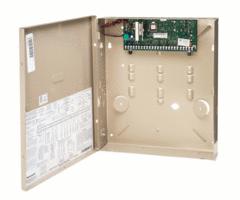Why Would I Want a Wired Alarm System Over a Wireless Alarm System?
There are a few reasons why you would want a wired alarm system over a wireless alarm system. Wired alarm systems integrate with the building, which can add to the property value. They are also sometimes more suitable for commercial applications, where certain regulations may be in place.

Most DIY users are better off going with a wireless system. These systems are easier to install, require fewer add-ons and are generally more user-friendly. We encourage you to check out this FAQ, which outlines the advantages of using a wireless system. That being said, there are occasionally some users who may be better off going the hardwired route instead.
A hardwired alarm system is like a long-term investment. Initial setup and installation can be very challenging. Wires will need to be run and fished through walls. Many end users cannot complete these tasks on their own, and they will need to hire an outside professional. But the payoff is that the system will essentially become integrated with the building. It will basically become another bonus feature of the property, much like adding a swimming pool or new floors. In that sense, a hardwired alarm system can sometimes increase property values.
Traditionally, hardwired panels offered certain features not available with wireless systems. This included the ability to section-off the system into different partitions. This has changed in recent times, as certain wireless panels now offer partitioning support. But these wireless systems still might not support as many partitions as a high-end commercial hardwired wired system. For example, the VISTA Turbo Series Panels can support up to eight partitions. Additionally, certain zoning laws may require the use of commercial grade systems with polling loop capabilities.
Some users may also appreciate the high-level of customization that frequently comes with wired alarm systems. These panels are usually pretty bare-bones from the start. They offer nothing more than the panel itself. You will need to add a keypad, an alarm system communicator, an automation controller and a wireless receiver if you want to use wireless sensors. Basically, you can choose exactly what you need, while skipping any add-ons that don't benefit you. Although most users prefer wireless systems where nearly everything is included, some users may prefer the greater flexibility that comes with designing and installing a wired system.
Finally, one advantage that wired systems have over wireless systems is that they typically require fewer batteries. In most cases, the system will just have one main backup battery. This battery will provide backup power for the panel, sensors and all other equipment. Wireless systems usually have a backup battery for the panel, and each sensor will also require its own batteries. These batteries will need to be replaced every few years, and a user with many wireless sensors can expect to spend a fair amount of money on replacement batteries when that time comes. For that reason, a user may prefer a hardwired system where only one battery will need to be replaced.
Did you find this answer useful?
We offer alarm monitoring as low as $10 / month
Click Here to Learn MoreRelated Categories
- Answered
